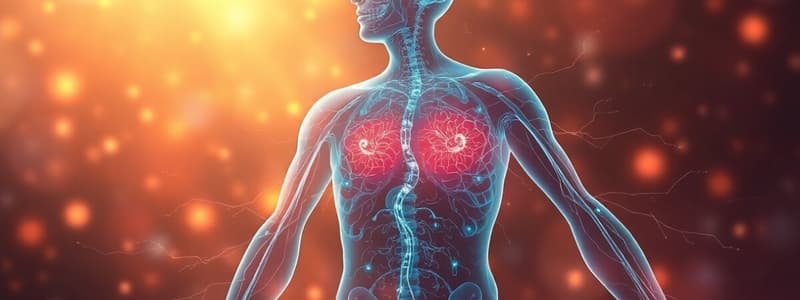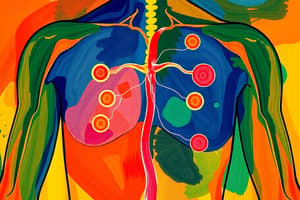Podcast
Questions and Answers
What is the primary function of lymphatic capillaries?
What is the primary function of lymphatic capillaries?
- Transport oxygen to tissues
- Produce antibodies to fight infections
- Take up and return excess fluid to the bloodstream (correct)
- Activate T cells in response to pathogens
Which lymphoid organ is primarily responsible for cleansing blood?
Which lymphoid organ is primarily responsible for cleansing blood?
- Tonsils
- Thymus Gland
- Spleen (correct)
- Red Bone Marrow
What role do macrophages play in the lymph nodes?
What role do macrophages play in the lymph nodes?
- Transport lymph to the bloodstream
- Cleanse lymph (correct)
- Produce antibodies
- Stimulate histamine release
Which defense mechanism is categorized as non-specific immunity?
Which defense mechanism is categorized as non-specific immunity?
What type of cells primarily migrate to the site of injury during an inflammatory reaction?
What type of cells primarily migrate to the site of injury during an inflammatory reaction?
The thymus gland is important for which specific immune function?
The thymus gland is important for which specific immune function?
What does an antigen stimulate in the immune system?
What does an antigen stimulate in the immune system?
Which of the following is a function of red bone marrow?
Which of the following is a function of red bone marrow?
What is the primary function of plasma cells?
What is the primary function of plasma cells?
Which type of T cell is specifically responsible for destroying infected cells?
Which type of T cell is specifically responsible for destroying infected cells?
What triggers clonal expansion in B lymphocytes?
What triggers clonal expansion in B lymphocytes?
What is passive immunity?
What is passive immunity?
How do helper T cells contribute to the immune response?
How do helper T cells contribute to the immune response?
What is the role of memory B cells?
What is the role of memory B cells?
Which of the following statements about allergies is true?
Which of the following statements about allergies is true?
What results from agglutination during blood type reactions?
What results from agglutination during blood type reactions?
Flashcards
Lymphatic System
Lymphatic System
A system of vessels and organs that collects excess fluid, filters it, and returns it to the bloodstream. It also plays a vital role in immune defense by transporting immune cells and filtering out pathogens.
Lymph Nodes
Lymph Nodes
Small bean-shaped organs that filter lymph fluid, removing pathogens and debris, and house immune cells that attack invaders.
Spleen
Spleen
A large organ located in the upper left abdomen that filters blood, removing old red blood cells and pathogens.
Thymus Gland
Thymus Gland
Signup and view all the flashcards
T Cells
T Cells
Signup and view all the flashcards
Antigen
Antigen
Signup and view all the flashcards
Nonspecific Immunity
Nonspecific Immunity
Signup and view all the flashcards
Specific Immunity
Specific Immunity
Signup and view all the flashcards
What are B cells responsible for?
What are B cells responsible for?
Signup and view all the flashcards
What is clonal selection theory?
What is clonal selection theory?
Signup and view all the flashcards
What are memory B cells?
What are memory B cells?
Signup and view all the flashcards
What do cytotoxic T cells do?
What do cytotoxic T cells do?
Signup and view all the flashcards
What are helper T cells responsible for?
What are helper T cells responsible for?
Signup and view all the flashcards
How are T cells activated?
How are T cells activated?
Signup and view all the flashcards
What is active immunity?
What is active immunity?
Signup and view all the flashcards
What is passive immunity?
What is passive immunity?
Signup and view all the flashcards
Study Notes
Lymph Transport and Immunity
- Lymph transport system comprised of lymphatic vessels and lymphoid organs
- The lymphatic system maintains homeostasis by collecting excess fluid from tissues and returning it to the bloodstream.
- Lymphatic capillaries absorb fats from the digestive system through lacteals and transports them to the bloodstream.
- Lymph circulates one way from capillaries to vessels, eventually flowing into a lymphatic duct which drains into a subclavian vein,
Lymphoid Organs
-
Lymph nodes have cortex and medulla regions. Lymphocytes congregate in the cortex when fighting pathogens. Macrophages cleanse lymph in the medulla. Lymph Nodes are named for their location.
-
Tonsils are patches of lymphatic tissue positioned around the pharynx, initially encountering pathogens entering via the nose and mouth.
-
The spleen is located in the upper left abdominal cavity, positioned beneath the diaphragm. It cleanses the blood.
-
The thymus gland sits along the trachea behind the sternum in the upper thoracic cavity. It produces thymic hormones.
-
Red bone marrow serves as the origin for all blood cells and is the maturation site for most white blood cells
Immune System (Non-Specific Defenses)
-
Barriers like skin and mucous membranes (including ciliated cells in the respiratory tract) form a physical defense against pathogens.
-
The inflammatory response is triggered when damaged cells and mast cells release histamine and kinins. Capillaries dilate, allowing neutrophils and monocytes to migrate to the injury site and engulf pathogens. Monocytes differentiate into macrophages.
Immune System (Specific Defenses)
-
Antigens are foreign substances that trigger the immune response.
-
Lymphocytes recognize antigens through specific receptors.
-
B cells produce antibodies that bind to and inactivate antigens.
-
T cells directly attack cells that display non-self proteins.
Antibody-Mediated Immunity (B lymphocytes)
- The clonal selection theory explains how an antigen selects a specific lymphocyte to undergo clonal expansion and produce more lymphocytes for the immune response.
- Memory B cells enable the body to respond faster and stronger to subsequent encounters with the same antigen.
Cell-Mediated Immunity (T cells)
- Cytotoxic T cells directly destroy antigen-carrying cells by releasing perforins which create pores in the target cell causing it to die.
- Helper T cells regulate the immune response by releasing cytokines.
Active versus Passive Immunity
- Active immunity develops through exposure to a pathogen or its components, developing memory lymphocytes for long-lasting protection.
- Passive immunity involves receiving pre-formed antibodies from another source, offering a temporary immune response.
Immunity Side Effects
- Allergies are hypersensitivities to substances that usually would not harm the body,. Immediate reactions are triggered by IgE antibodies, while delayed reactions involve memory T cells.
- Blood type reactions (ABO) can lead to agglutination if incompatible antigens and antibodies combine.
- Tissue rejection is the immune system's response to foreign tissue; cytotoxic T cells and antibodies target and destroy these tissues.
- Autoimmune diseases arise when the immune system mistakenly attacks the body's own cells.
Studying That Suits You
Use AI to generate personalized quizzes and flashcards to suit your learning preferences.



